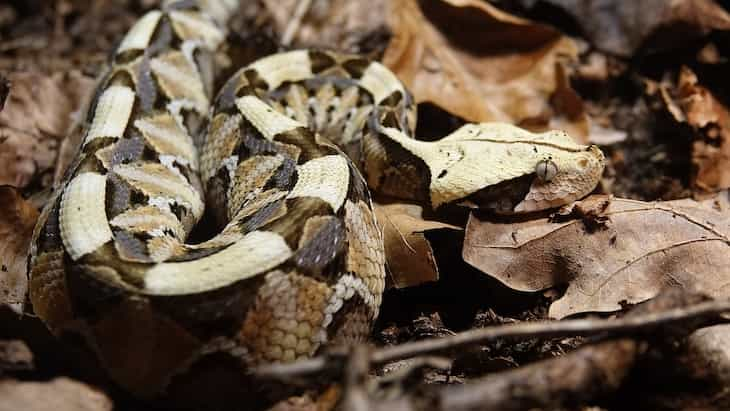From all animals, snakes seem to be quite alike – these serpents only seem to have different sizes and colors.
Meanwhile, snakes can also be amazing, because of their unique features and abilities.
Let's find out more about the most unusual snakes in the world.

Gaboon Viper
Known for its triangular head and the longest fangs of any snake.
It has a unique pattern on its scales, resembling a leafy forest floor.
Typically found in the rainforests of Africa, it relies on its excellent camouflage for hunting.
Flying Snake
Although not truly flying, it can glide through the air by using its body movements.
Found in Southeast Asia, these snakes are arboreal, spending much of their time in trees.
Their ability to glide helps them move between trees and catch prey.
Hognose Snake
Recognized by its upturned snout, which it uses for digging and burrowing.
Can play dead as a defense strategy, making it appear less threatening to predators.
Often found in North America, the Hognose snake prefers sandy or loose soils.
Anaconda
One of the largest snakes globally, known for its powerful and robust build.
Excellent swimmer, often found in swamps and slow-moving rivers in South America.
Constricts its prey, usually aquatic animals like fish and caimans.
Death Adder
Possesses a short, stocky appearance with a fast striking ability.
Native to Australia and nearby regions, often found in woodlands and grasslands.
Known for potent venom, making it a highly efficient predator.
Horned Viper
Features horn-like scales above its eyes, giving it a distinctive appearance.
Typically found in sandy or rocky areas, where its appearance helps it blend in.
Native to the deserts of North Africa and the Middle East.
Woma Python
Known for its smooth appearance and attractive pattern.
Can wedge itself into tight spaces, allowing it to hide and ambush prey effectively.
Found in arid regions of Australia, demonstrating adaptability to harsh environments.
Boa Constrictor
Considered one of the larger snake species globally, with a powerful, muscular body.
Uses constriction to capture and subdue prey before swallowing it whole.
Diverse, found in tropical rainforests, savannas, and semi-arid regions across the Americas.
Previously, we talked about rhinoceros beetles.












